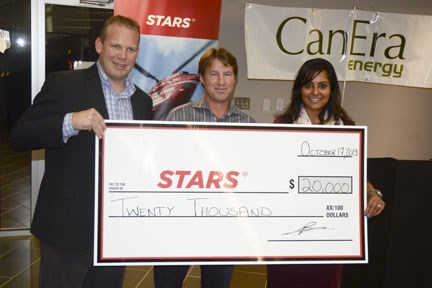Although they have been serving Saskatchewan for just over two years, the STARS air ambulance program is already expanding its operations.
Beginning in 2014, STARS will introduce a mobile education and training program for medical professionals throughout the province. An event was held Thursday at the Saskatchewan Energy Training Institute where CanEra Energy announced a donation of $20,000 towards the program.
Paul Charron, the CEO and president of CanEra, said the company has been looking for a charitable organization to contribute to and felt with numerous properties in Saskatchewan, STARS was a good fit.
"It really occurred to me and really struck home, that we are fairly well spread out and we are in some remote areas," Charron said. "When we are drilling wells, we actually register the site with STARS so if there is an accident or something happens at one of our sites, STARS knows exactly where to go and has a safe place to land so they can transport whoever is injured if they require the air ambulance. For our business and the nature of our assets, we think it is a great cause to support."
Along with the announcement of CanEra's support, officials from STARS were on hand with the mobile unit they use for the same program in Alberta.
Cindy Seidl, the base director for STARS Saskatoon base, said the mobile education program has been operating in Alberta for a number of years and they are excited to roll it out to Saskatchewan.
Seidl said the unit will travel to various communities to help build skills or provide a refresher to anyone in need.
"If we have a community that just had a major trauma and they need to do work on putting airways in, chest tubes, we'll take the unit out and the mobile education leader will tailor that training and teaching session to the communities' needs," Seidl said.
"It's multi-disciplinary; we use physicians, nurses, EMS, first-responders and we do training for all groups of care providers that are front line and first on the scene."
Seidl said the benefit of the unit is it gives the medical personnel the chance to work on skills they may not routinely perform in a safe environment. Because the unit travels to the communities, it also allows those involved a chance to get training without having to travel to centres like Regina and Saskatoon.
"It is very difficult in rural Saskatchewan to get nurses and physicians to leave their communities to get the education that they need to maintain some of their skills or improve on existing skills," said Seidl, who added there is no cost for the training.
"We could bring this unit to Estevan, to the hospital, the staff can come out, EMS will be right there and we work as a team and go through some of the training and scenarios."
The mobile unit contains a human patient simulator with a mannequin that allows the trainers to simulate all types of medical situations.
"We come up with a scenario and this guy exhibits the signs," said Seidl. "We have somebody in the back (of the motorhome), a controller, and the mannequin will actually talk to the care provider and say, 'I don't feel well, I am having chest pains.' (The controller) has the ability to put up what they would see vital-signs wise on the monitors up on the wall and make it as real a scenario as possible."
"The goal is to learn this in a safe environment," added Matt Hogan, a STARS pilot/paramedic, who was also in Estevan Thursday. "It's really hard to simulate this without the proper equipment. We can make this as realistic as possible because in simulation, the evidence shows if you make it as real as possible your brain is going to register that the same way if you did the real call."
The Saskatchewan mobile unit will begin operation in 2014.




